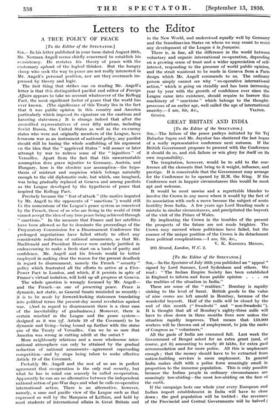Letters to the Editor
A TRUE POLICY OF PEACE
[To the Editor of the SPECTATOR.]
Si a,—In his letter published in your issue dated August 30th, Mr. Norman Angell seems chiefly concerned to establish his consistency. He restates his theory of peace with the customary aplomb of the logical thinker. But the hungry sheep who seek the way to peace are not really interested in Mr. Angell's personal position, nor are they overmuch im- pressed by theory and logic.
The first thing that strikes one on reading Mr. Angell's letter is that this distinguished pacifist and editor of Foreign Affairs appears to take no account whatsoever of the Kellogg Pact, the most significant factor of peace that the world has ever known. (The significance of this Treaty lies in the fact that it was public opinion in this country and America particularly which imposed its signature on the cautious and havering statesmen.) It is strange indeed that after the accredited representatives of over fifty nations, including Soviet Russia, the United States as well as the ex-enemy states who were not originally members of the League, have forsworn war as an instrument of national policy, any pacifist should still be basing the whole scaffolding of his argument on the idea that the " aggrieved States " will sooner or later attempt by war to redress some of the " injustices " of Versailles. Apart from the fact that this unwarrantable assumption does grave injustice to Germany, Austria, and Hungary, here is the obsolete war assumption—the hypo- thesis of mistrust and suspicion which belongs naturally enough to the old diplomatic code, but which, one imagined, was being gradually replaced at Geneva and among pacifists as the League developed by the hypothesis of peace that inspired the Kellogg Pact.
Precisely because the " fear of attack " (the motive imputed by Mr. Angell to the opponents of " sanctions ") would still Le the cornerstone of the League's peace system as conceived by the French, those of us who are living in the world of 1930 cannot accept the idea of any true peace being achieved through " sanctions." In the measure that France and her satellites have been allowed so far to dominate the proceedings of the Preparatory Commission for a Disarmament Conference the prolonged negotiatidns have failed utterly to effect any considerable reduction of national armaments, so that Mr. MacDonald and President Hoover were entirely justified in endeavouring to make a fresh start on a basis of parity and confidence. Mr. Angell and his friends would be better employed in making clear the reason for the present deadlock in regard to disarmament, namely the French " security " policy which frustrated all the efforts to arrive at a Five- Power Pact in London, and which, if it persists in spite of France's virtual isolation, will hold up all progress at Geneva.
The whole question is wrongly focussed by Mr. Angell— and the French—as one of preserving peace. Peace is dynamic, not static, as General Smuts reminded us recently : it is to be made by forward-looking statesmen translating into political terms the present-day moral revolution against war. (And in regard to disarmament there is a clear case of the inevitability of gradualness.) Moreover, there is certain mischief in the League and the peace system— designed as it was (cf. Article 19 of the Covenant) to be dynamic and living—being bound up further with the status quo of the Treaty of Versailles. Can we be so sure that America was wrong in cutting adrift at the outset ?
More neighbourly relations and a more wholesome inter- national atmosphere can only be attained . by the gradual reduction of national armaments—agreement superseding competition—and by steps being taken to make effective Article 19 of the Covenant.
Probably Mr. Angell and the rest of us are in perfect agreement that co-operation is the only real security, but what he has in mind can scarcely be called co-operation. Apparently he can see no alternative between the independent national action of pre-War days and what he calls co-operative international action. There is an alternative, however, namely, a sane and pacific view of the League such as that expressed so well by the Marquess of Lothian, and held by most students of international affairs in Great Britain and
in the New World, and understood equally well by Germany and the Scandinavian States on whom we may count to resist any development of the League a /a franrnise.
There is, in fine, all the difference in the world between voluntary and organic international co-operation, depending on a growing sense of trust and a wider appreciation of self- interest, responding to the pressure of world public opinion, and the strait waistcoat to be made in Geneva from a Paris design which Mr. Angell commends to us. The ordinary person simply cannot see why " co-operative international action," which is going on steadily and has been increasing year by year with the growth of confidence ever since the League came into existence, should require to borrow this machinery of " sanctions " which belongs to the thought. processes of an earlier age, well called the age of international










































 Previous page
Previous page